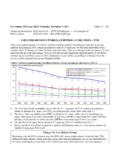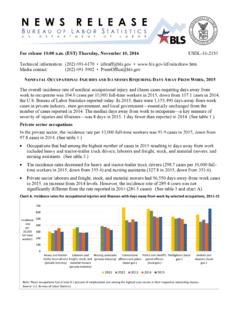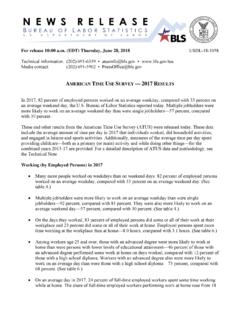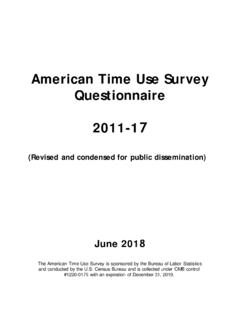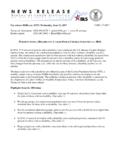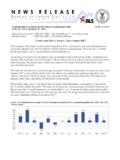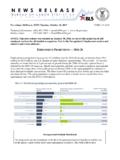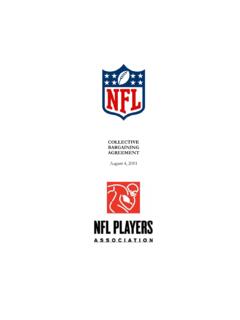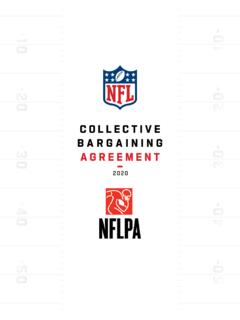Transcription of DEFINITIONS OF HEALTH INSURANCE TERMS - Bureau of …
1 1 DEFINITIONS OF HEALTH INSURANCE TERMSIn February 2002, the Federal Government s Interdepartmental Committee onEmployment-based HEALTH INSURANCE Surveys approved the following set of definitionsfor use in Federal surveys collecting employer-based HEALTH INSURANCE data. The BLSN ational Compensation Survey currently uses these DEFINITIONS in its data collectionprocedures and publications. These DEFINITIONS will be periodically reviewed and updatedby the (Administrative Services Only) An arrangement in which an employer hires athird party to deliver administrative services to the employer such as claims processingand billing; the employer bears the risk for claims.
2 This is common in self-insured HEALTH care - A form of medical cost sharing in a HEALTH INSURANCE plan that requires aninsured person to pay a stated percentage of medical expenses after the deductibleamount, if any, was paid. Once any deductible amount and coinsurance are paid, the insurer is responsiblefor the rest of the reimbursement for covered benefits up to allowed charges: theindividual could also be responsible for any charges in excess of what the insurerdetermines to be usual, customary and reasonable . Coinsurance rates may differ if services are received from an approved provider( , a provider with whom the insurer has a contract or an agreement specifyingpayment levels and other contract requirements) or if received by providers noton the approved list.
3 In addition to overall coinsurance rates, rates may also differ for different typesof - A form of medical cost sharing in a HEALTH INSURANCE plan that requires aninsured person to pay a fixed dollar amount when a medical service is received. Theinsurer is responsible for the rest of the reimbursement. There may be separate copayments for different services. Some plans require that a deductible first be met for some specific servicesbefore a copayment - A fixed dollar amount during the benefit period - usually a year - that aninsured person pays before the insurer starts to make payments for covered medicalservices.
4 Plans may have both per individual and family deductibles. Some plans may have separate deductibles for specific services. For example, aplan may have a hospitalization deductible per admission. Deductibles may differ if services are received from an approved provider or ifreceived from providers not on the approved spending accounts or arrangements (FSA) - Accounts offered andadministered by employers that provide a way for employees to set aside, out of theirpaycheck, pretax dollars to pay for the employee s share of INSURANCE premiums ormedical expenses not covered by the employer s HEALTH plan.
5 The employer may alsomake contributions to a FSA. Typically, benefits or cash must be used within the givenbenefit year or the employee loses the money. Flexible spending accounts can also beprovided to cover childcare expenses, but those accounts must be established separatelyfro m medical benefits plan (Cafeteria plan) (IRS 125 Plan) A benefit program underSection 125 of the Internal Revenue Code that offers employees a choice betweenpermissible taxable benefits, including cash, and nontaxable benefits such as life andhealth INSURANCE , vacations, retirement plans and child care.
6 Although a common core ofbenefits may be required, the employee can determine how his or her remaining benefitdollars are to be allocated for each type of benefit from the total amount promised by theemployer. Sometimes employee contributions may be made for additional insured plan - A plan where the employer contracts with another organization toassume financial responsibility for the enrollees medical claims and for all incurredadministrative - Under some HEALTH INSURANCE arrangements, a gatekeeper is responsible forthe administration of the patient s treatment; the gatekeeper coordinates and authorizes allmedical services, laboratory studies, specialt y referrals and hospitalizat purchasing arrangement Any of a wide array of arrangements in which two ormore small employers purchase HEALTH INSURANCE collectively, often through a commonintermediary who acts on their collective behalf.
7 Such arrangements may go by manydifferent names, including cooperatives, alliances, or business groups on HEALTH . Theydiffer from one another along a number of dimensions, including governance, functionsand status under federal and State laws. Some are set up or chartered by States whileothers are entirely private enterprises. Some centralize more of the purchasing functionsthan others, including functions such as risk pooling, price negotiation, choice of healthplans offered to employees, and various administrative tasks. Depending on theirfunctions, they may be subject to different State and/or federal rules.
8 For example, theymay be regulated as Multiple Employer Welfare Arrangements (MEWAs). Association HEALTH Plans This term is sometimes used loosely to refer to anyhealth plan sponsored by an association. It also has a precise definition under theHealth INSURANCE Portability and Accountability Act of 1996 that exempts fromcertain requirements insurers that sell INSURANCE to small employers only throughassociation HEALTH plans that meet the Care Plans and Systems Indemnity plan - A type of medical plan that reimburses the patient and/or provideras expenses are incurred. Conventional indemnity plan - An indemnity that allows the participant the choiceof any provider without effect on reimbursement.
9 These plans reimburse the patientand/or provider as expenses are incurred. Preferred provider organization (PPO) plan - An indemnity plan where coverageis provided to participants through a network of selected HEALTH care providers (suchas hospitals and physicians). The enrollees may go outside the network, but wouldincur larger costs in the form of higher deductibles, higher coinsurance rates, or non-discounted charges from the providers. Exclusive provider organization (EPO) plan - A more restrictive type of preferredprovider organization plan under which employees must use providers from thespecified network of physicians and hospitals to receive coverage; there is nocoverage for care received from a non-network provider except in an emergencysituation.
10 HEALTH maintenance organization (HMO) - A HEALTH care system that assumes boththe financial risks associated with providing comprehensive medical services( INSURANCE and service risk) and the responsibility for HEALTH care delivery in aparticular geographic area to HMO members, usually in return for a fixed, prepaidfee. Financial risk may be shared with the providers participating in the HMO. Group Model HMO - An HMO that contracts with a single multi-specialtymedical group to provide care to the HMO s membership. The group practicemay work exclusively with the HMO, or it may provide services to non-HMOpatients as well.

